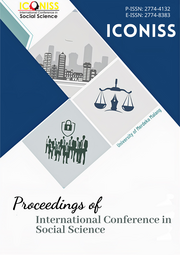Synergy of Sanitation Development in Malang District
DOI:
https://doi.org/10.26905/iconiss.v3i1.9695Keywords:
Domestic wastewater, Implementation of public policies, Malang Regency, SanitationAbstract
Management of sanitation in Malang Regency has not been carried out in an integrated planning and implementation between agencies or institutions. Referrring to the Strategy Sanitation of Malang regency document compiled in 2016, it can been seen that sanitation development is still partially carried out or divided based on the institutional sector. It caused many problems in sanitation development, moreover it can not solve the main problem in sanitation. Bad communication and system coordination are the main factor that is predicted to be the cause. Furthermore, limited human resources for sanitation development actors in government agency is also resuts in incomplete handling. Moreover, it coupled with the vast area of Malang Regency and varied geographical conditions. the budget factor is also an equally important cause in sanitation development. No matter how big the goal is in solving sanitation problems, without adequate financial support, development will be obstructed. Based on data from the Malang District Health Office, in 2021 Malang Regency is still have open defecation practice in the area (Buang Air Besar Sembarangan = BABS). Basic access achievement in Malang Regency is 97.94% leaving 2.06% open defecation. There is no Integrated Waste Treatment Plant (IPLT), Local regulations on wastewater, and Scheduled Sludge Service (LLTT) in Malang Regency which gives fundamental problem towards safe sanitation. Implementation of sanitation development policies in Malang Regency according to the mandate of Malang Regent Regulation No. 51 of 2016 concerning Community-Based Led Sanitation, is currently running, although there are still many shortcomings in its implementation.Â
Downloads
References
Abdullah, A. Y., & Rusfiana, Y. (2016). Teori dan analisis kabijakan publik. Bandung: CV Alfabeta.
Arikunto, S. (1996). Prosedur penelitian. Jakarta: Rineka Cipta.
Darma, P. K. (2020). Dilema COVID-19 dan Manajemen Kebijakan Publik. Retrieved from: https://indonews.id/artikel/29269/Dilema-COVID-19-dan-Manajemen-Kebijakan-Publik/.
Dunn, W. N. (2003). Pengantar analisis kebijakan publik (Edisi Kedua). Yogyakarta: Gadjah Mada University Press.
Handoyo, E. (2012). Kebijakan publik. Semarang: Widya Karya.
Kurniasih, W. 15 Pengertian Kebijakan Publik Menurut Para Ahli. Gramedia Blog. Politik Ekonomi Online. Retrieved from: https://www.gramedia.com/literasi/pengertian-kebijakan-publik/
Malang Regent Regulation No. 51 of 2016 concerning Community-Led Total Sanitation.
Moleong, L. J. (2012). Metodologi penelitian kualitatif. Bandung: PT Remaja.
Sumarni, M., & Wahyuni, S. (2006). Metode penelitian bisnis (Edisi 1). Yogyakarta: ANDI.
Sugiyono. (2017). Metode penelitian kuantitatif, kualitatif, dan R&D. Bandung: Alfabeta
Widiastuti, A. (2019). Pengelolaan Sanitasi Lingkungan Dalam Pembangunan Daerah di Kota Serang. Retrieved from: https://jurnal.untirta.ac.id/index.php/Ekonomi-Qu/article/view/7166/4887
Widodo, J. (2021). Analisis kebijakan public (Edisi Revisi). Malang: Media Nusa Creative.
Downloads
Published
Issue
Section
License
Authors who publish in this journal agree to the following terms:
(1)Â Copyright of the published articles will be transferred to the journal as the publisher of the manuscripts. Therefore, the author confirms that the copyright has been managed by the journal.
(2) Publisher of Proceedings of International Conference in Social Science is the University of Merdeka Malang.
(3) The copyright follows Creative Commons Attribution–ShareAlike License (CC BY SA): This license allows to Share — copy and redistribute the material in any medium or format, Adapt — remix, transform, and build upon the material, for any purpose, even commercially.

